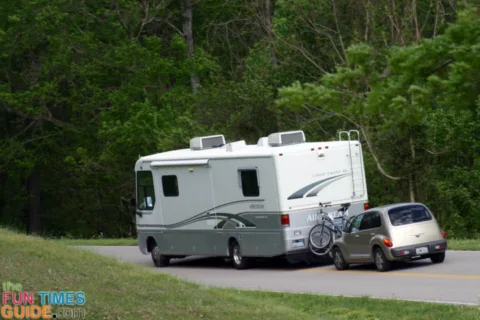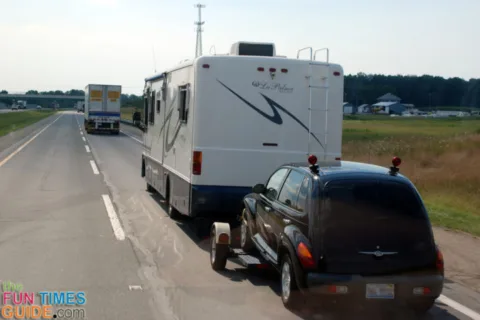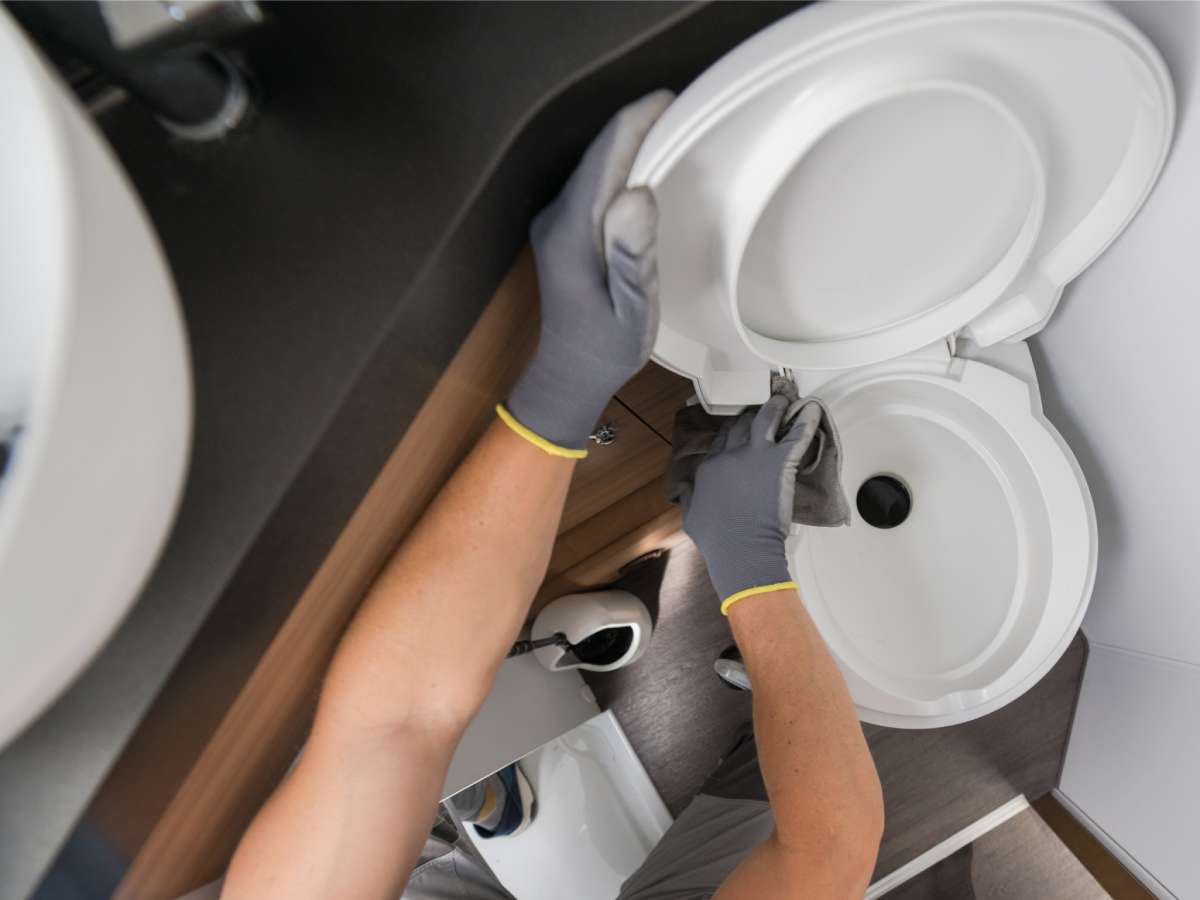For the longest time, Saturns were the #1 choice among vehicles that can safely be towed 4 wheels down behind an RV with a tow bar.
These days, Jeep Wranglers seem to be the popular choice for motorhome towing.
Most Jeep and Saturn vehicles can be towed without modifications, as well as various Chevy, Ford & Dodge cars, trucks & SUVs. Check with your dealer to verify tow-ability. It can be very costly to repair a vehicle that has been towed when it should not have been.
–RVAccessory
Here’s how to tow a Jeep with all wheels down.
Generally speaking, the best vehicle to tow behind a motorhome is one that:
- Can be towed with its wheels on the ground
- Is relatively lightweight
- Doesn’t register miles while being towed
The lighter the vehicle is, the less wear and tear on the RV and motorhome towing system as well!
See if your car is capable of being towed four wheels down, plus what you need to know about flat towing vs trailering with a tow dolly…
Cars That Can Be Flat Towed 4 Wheels Down
- Trailer Life maintains the best list of factory tow ratings for vehicles each year. You’ll find tow-rating data for 1991 through the current model year.
- The Ford Towing Guide is helpful if you drive a Ford vehicle. (See also this Ford RV & Trailer Towing Guide.)
- Camping World has a Dinghy Towing Guide which highlights the best vehicles for towing behind RVs.
Years ago, finding cars suitable for flat towing wasn’t all that hard. Most cars and trucks with manual transmissions could be pulled four-down, as could most four-wheel-drive SUVs with manual transfer cases. But things change. Today the plethora of electronic transmissions and front-wheel and full- and part-time four-wheel-drive systems require a bit of planning when you are selecting flat-towed cars and trucks.
~ Source
Here are some great tips for flat towing four wheels down from Motorhome Magazine.
With The Proper Equipment, Most Cars Can Be Towed
It’s worth noting that most vehicles that are not approved by their manufacturers for towing on all 4 wheels can still be towed using aftermarket accessories — such as a cable-operated driveshaft-disconnect device (rear-wheel-drive vehicles only), a driveshaft-disconnect device, or free-wheeling hubs (front-wheel drive).
Here’s what towing experts say:
- You can tow any front wheel drive manual transmission vehicle as far as you want and as long as you want. However, as an added precaution, you might want to consider a Lube Pump or Axle Lock to ensure that no transmission damage will occur.
- Most four-wheel drive vehicles with a manual transmission, manual transfer case, and manual lock out hubs can be towed on all 4 wheels safely with no problems.
- If your four-wheel drive vehicle has no manual lockout hubs and/or no manual transfer case… you will need a coupling device on the rear drive shaft in order to tow it safely.
Here are some helpful tips for choosing the right tow vehicle.
Flat Towing vs. Trailering Pros And Cons
Following are some tips before you hit the road with your vehicle in tow behind your RV, plus a summary of the ways that towing anything behind your RV requires a whole different way of driving.
For starters, this video is filled with helpful recommendations and gives you a visual explanation of how and why you need to do some things differently when you’re towing a dinghy behind your motorhome:
Motorhome Towing Four Wheels Down
Towing your vehicle 4 wheels down (also called “dinghy towing” or “toading”) has many advantages and is becoming more and more popular among RVers.
Four-wheel down toading has little or no effect on the:
- Handling
- Gas mileage
- Overall wear & tear of your RV
Plus, it gives you freedom to go sightseeing, shopping, and exploring on a whim!
On the other hand, to tow your vehicle with 2 wheels up or 4 wheels up, you’d have to purchase a trailer or a tow dolly.
Motorhome Towing With A Dolly
Towing a car behind a motorhome with a tow dolly does come with some inconveniences.
Here are a few:
- In some states (like Washington) tow dollies must have a separate license plate.
- A tow dolly adds 500 to 1,500 pounds to the towed weight — which will now total 4,000 or 5,000 pounds.
- Due to the added weight, a tow dolly requires on-board brakes — which significantly increases the price and maintenance.
- It’s not easy to back up a tow dolly — it will definitely take some practice.
- You need to plan ahead what you will do with the tow dolly once you arrive at your destination.
- It typically takes 2 people to maneuver the tow dolly out of the way while your RV is parked and you’re driving the toad.
- A tow dolly requires regular maintenance and repairs on the tires, wheels, and frame.
- Two sets of safety cables are required — 1 to secure the motorhome to the tow dolly, and 1 to secure the tow dolly to the vehicle. (Tie-down straps frequently fail on tow dollies.)
- It’s not always easy to connect the brake lights, stop lights, and clearance lights on a dolly-towed vehicle.
- Perhaps the only benefit to using a tow dolly is that the vehicle being towed would not require any special modifications.






